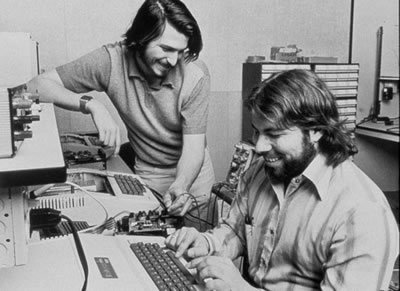While I often prefer to watch analysts hoist themselves with their own petard, it’s not often that one dumps out a bit of drivel so short-sighted as George Colony at Forrester. In short, Colony believes that Apple is the next Sony – a desiccated organization that has nothing new to offer the world. While he’s right about Sony, he’s wrong about Apple.
Analysts, to be fair, do know a thing or two about a thing or two. I’m sure he’s great at plumbing financial data and picking expensive steaks. But in this Forbes piece he cites Max Weber’s Theory of Social And Economic Organization, a book that I read in college but haven’t had the time to peruse of late. Weber, writing in 1947, breaks organizations down into legal/bureaucratic, traditional, and charismatic. Weber probably knew from charismatic, considering his demi monde, but I doubt his version of a charismatic leader – “he is set apart from ordinary men and treated as endowed with supernatural, superhuman, or at least specifically exceptional powers or qualities” – is applicable in any case in our modern business climate.
Colony goes on to posit that without a Gandhi-like (or, if we’re being unkind, Jim Jones-like) übermensch at the helm, Apple will peter out just as Disney (still going after 20 years), Sony (not going as strong, but they rule a third of the gaming space) and Microsoft (what a dog that company is, amirite, guys?) did. Rather than seeing a number of vibrant companies duking it out for market share, Colony sees a darkling plain where ignorant armies clash by night. All is vanity, indeed.
If anything, Apple can become the next Disney – but with a specific caveat. Walt Disney, like Jobs, was a micromanager until he wasn’t. If you follow his life (read Gabler’s Walt Disney: The Triumph of the American Imagination even if you don’t care about Disney – it’s a great management biography) you’ll see a period of intense work followed by what can be called a period of pouring new wine into old skins. What worked under Disney – an intensity of purpose, a focus on story and the physical, a perfectionist’s eye for production quality – are what were ingrained in the company throughout its long history. The cultural products that came from Disney studios are beloved by nearly everyone and, aside from an arguably rough patch in the 90s and the recent John Carter fiasco, they still own Pixar, they still made Tangled, and they still make a load of money at their amusement parks.
What’s the caveat, then? Apple makes premium products for the world market. Disney’s product suffers from piracy, competition, and the fickleness of art. Apple’s (barely) suffers from copycats and the vagaries of manufacturing. You don’t need Walt Disney to greenlight every move Mickey’s ear makes in Fantasia. You need a company-wide understanding of timing, story, and grace. Nor do you need Steve Jobs to greenlight the rounded edge of an on-screen iPhone button. You need a company-wide understanding of timing, story, and grace.
The Apple org chart was once a star with Jobs at the center. Now that center may be diffuse, but I doubt sincerely that Cook and Ive can’t keep the center held given the focus and clarity that Apple has exhibited to date. Given a proper culture and identity, Apple can remain Apple and, considering the state of the company thanks to years of missteps and hubris, it will never become Sony.
